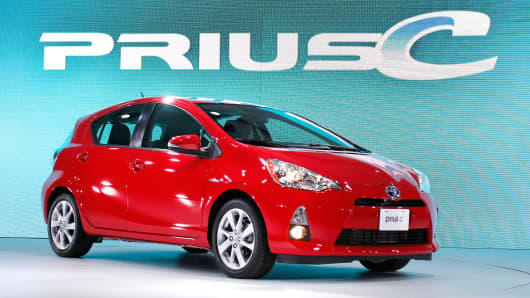Demand for hybrid and battery-operated cars may be increasing—the Toyota Prius accounted for 3.1 percent of the total U.S. new car market last year—but that doesn't mean car buyers are trading in their eco-cars for another "green" model.
According to industry reports, only about one in three hybrid owners buy another gas-electric model when they trade in.
Not that demand for eco-cars has waned: Green car buying set an all-time record in 2012. Sales of the ever-popular Toyota Prius increased 49 percent year-over-year from the 2.2 percent market share in 2011.
But demand continues to lag proponents' expectations. It appears all but certain that the Obama administration's goal of having one million plug-ins or BEVs on the road by the end of 2014 won't happen. Pricing and range limitations remain critical factors.
Read More From NBCNews:
Reborn Detroit Electric Charges Into Battery-Car Market
Muscle Car Wars: It's All About the Horsepower
Toyota's Hybrid Vehicle Sales Pass 5 Million
One reason appears to be the ongoing gap between the mileage that manufacturers claim and reality on the road. That has led the EPA—which oversees fuel economy testing—to revise its ratings process several times over the past decade. Further revisions are now under discussion.
The hybrid car owner falls into a specific category of buyer, Experian Automotive research has found—beyond just their eco-sensibilities.
According to Experian, the typical hybrid buyer's loan came in at $25,807, compared to $26,691 for the average new auto loan last year. They also scored an interest rate of just 3.51 percent, compared with 4.36 percent for the average American auto buyer.
"Hybrid vehicle owners have long been perceived as environmentally-conscience consumers," said Melinda Zabritski, Experian's director of automotive credit. "While they may have made the vehicle purchase due to caring for the environment, our research shows that hybrid owners are economically minded as well. Hybrid owners tend to have outstanding credit histories, which also has enabled them to obtain financing at lower rates than typical consumers."
The 10 most popular hybrids—at least those financed rather than purchased outright:
1. Toyota Prius -- 37.2 percent
2. Toyota Camry -- 8.9 percent
3. Toyota Prius V -- 8.6 percent
4. Toyota Prius C -- 8.1 percent
5. Chevrolet Volt -- 6.3 percent
6. Hyundai Sonata -- 4.8 percent
7. Lexus CT 200h -- 4.2 percent
8. Kia Optima -- 2.7 percent
9. Nissan Leaf -- 2.7 percent
10. Lexus RX 450h -- 2.3 percent
What's significant about the 2012 Top 10 chart is that it includes two advanced battery models for the first time, the fifth place Chevrolet Volt plug-in hybrid and the battery-electric Nissan Leaf, in ninth.
Analysts expect that demand for all forms of battery-based vehicles will continue to grow in the coming years, if for no other reason than the steady increase in available products.
Most major manufacturers now offer several conventional hybrids and by the end of next year almost all plan to have plug-ins and pure battery-electric vehicles, or BEVs, in their showrooms, as well – though some may be limited to select markets, such as California.


